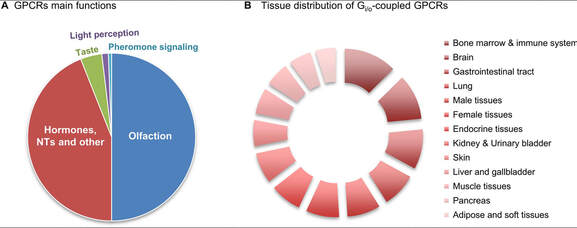|
Certainly, our practice has evidenced firsthand the effects of both long COVID and post vaccine developments. But, the big question still looming on the horizon - what will the NEXT 10 years bring?! This article certainly puts a spotlight on what we may be facing: https://www.ox.ac.uk/news/2023-05-06-autoimmune-disorders-found-affect-around-one-ten-people. Defending against a foreign pathogen. As we have discussed at length in previous blogs, molecular mimicry is thought to play a role in the development of autoimmunity. This may be due to the similarity of human peptides and pathogenic elements contained in the vaccine, such as spike protein. Studies have been unable to identify lingering active virus in long COVID cases; rather, it is the lingering spike protein that is thought to be the real culprit. Understanding spike protein: https://www.suzannegazdamd.com/blog---long-covid/long-covid-but-no-lingering-virus Research conducted in 2021 by Vojdani and his team showed 28 of 55 human tissues cross-reacting to these viral fragments. In this study, every major organ, numerous cell types, and even brain proteins including myelin, amyloid, neurofilament protein, tau, and others were in the direct line of fire. In yet another significant review, findings indicated that lingering spike protein following a COVID infection caused an autoimmune attack on the blood-brain barrier. Other scientists looked at post-vaccine implications. In a 2022 investigation, the authors noted multiple brain proteins involved in the maintenance of nerve conduction in the central and peripheral NS cross reacted with spike protein, warning that “based on these findings, re-evaluation of the vaccine composition is recommended to prevent possible neurological side effects." A new onslaught of autoimmune disease – but why is this happening now? I first wrote about the rise in autoimmune issues here, detailing the very real concerns regarding not only patients with long COVID that followed an infection, but also those who developed similar responses concurrent with the administration of one of the relevant vaccines. A systematic review of the literature on the different new-onset autoimmune phenomena after the application of various vaccines against COVID-19, first published in 2022, noted that all the identified autoimmune syndromes were of a new onset. A total of 277 cases included these disorders: Guillain-Barre syndrome (151 cases); vaccine-induced immune thrombotic thrombocytopenia or VITT (93 cases); autoimmune liver diseases (8 cases); immune thrombocytopenic purpura (7 cases); IgA nephropathy (5 cases); autoimmune polyarthritis (2 cases); rheumatoid arthritis (2 cases); Graves' disease (2 cases); diabetes mellitus type I (4 cases); and systemic lupus erythematosus or SLE (3 cases). It also has been proposed that COVID 19 vaccination can trigger autoimmune phenomena, probably inducing age-associated B cells (ABC cells) that produce autoantibodies which can lead to autoimmune disease. ABCs also produce both protective and inflammatory cytokines and stimulate T cells. ABCs are expanded during autoimmune disease, including those with systemic lupus erythematosus, multiple sclerosis, and rheumatoid arthritis. Once this pattern develops, it is very difficult if not impossible to reverse the effects on the immune system. Recently an article from the World Health Organization (WHO) reflected findings where the COVID vaccine was thought to have induced multiple sclerosis (MS) in two patients; our own observations include cases where relapses appear to have been triggered or there has been an astounding disease progression following a COVID vaccine. An increase in other conditions is also reflected by data from the last few years. For example, there was an unexpected surge in the diagnosis of Type 1 diabetes among children and teenagers worldwide amidst the global impact of the COVID-19 pandemic and numerous case reports have documented instances where patients developed Type 1 diabetes following either COVID-19 infection or COVID-19 vaccination. Yet another piece describing the association of inflammatory arthritis and COVID vaccines echoes our concerns as it highlights the autoimmune pandemic we currently are facing. The authors wrote, "Flares of an existing autoimmune disease linked to the COVID-19 vaccine have also been reported. According to guidance issued by the American College of Rheumatology, the possible theoretical risk of post-vaccination flare of autoimmune disease was acknowledged with moderate consensus." Still more potential issues… In 2011, researchers first described a syndrome referred to as ASIA (Autoimmune/inflammatory Syndrome Induced by Adjuvants), presenting with symptoms such as chronic fatigue, arthralgia, myalgia, cognitive impairment, and neurological issues (although these are atypical). In the past ten-plus years, evidence had been accumulating that (auto)immune symptoms can be triggered by exposure to environmental immune stimulatory factors that act as an adjuvant in genetically susceptible individuals. These adjuvants could include silicone breast implants, metal implants (like meshes used in hernia repairs), mineral oils, and fillers. A new examination published in 2023 reexamines the prior evidence and introduces new information linking the use of vaccines for COVID and human papilloma virus (HPV) with the onset of ASIA. Relevant to the novel COVID vaccines, several elements have been suggested that may act as adjuvants of the immune response. These include polyethylene glycol (PEG) 2000, often found in many consumer products and present in lipid layer BNT162b2 and mRNA-1273; polysorbate 80 (ChAdOx1 nCoV-19); and anti-spike antibodies that develop after exposure to the SARS-CoV-2 virus and subsequently stimulate the production of anti-idiotypic antibodies post vaccine. Additionally, some cases of postural orthostatic tachycardia syndrome (POTS) and dysautonomia also have been linked as a common side effect of COVID and the COVID vaccines. In ASIA, autoantibodies against G-protein coupled receptors are associated with dysautonomia. G protein receptors are a very complicated and extensive network involved in many different things but especially with cell to cell signaling. G Protein Coupled Receptors (GPCRs) comprise the largest family of transmembrane receptors, with over 800 members present in humans. The central nervous system (CNS) is particularly affected by these alterations, which results in decreased brain functions, impaired neuroregeneration, and increased vulnerability to neuropathologies. G protein-coupled receptors (GPCRs) play key roles in intercellular signaling in the brain and are the largest, and most diverse, family of cell-surface receptors in the human genome. These widespread receptor networks do many things and allow the nervous system to respond accurately to external stimuli and internal states. They also regulate mood and behavior as well as our immune response. Dysfunction of GPCRs plays a role in neurodegenerative disease.
Dysautonomia is a dysfunction of the nerves that regulate nonvoluntary body functions, such as heart rate, blood pressure, and sweating. POTS is a form of dysautonomia that affects the flow of blood through the body, thereby causing dizziness when standing. Studies also have shown that post COVID, autoantibodies develop against the GPCRs, and this can cause many downstream effects including a disturbance of the balance of neuronal and vascular processes. So, in long COVID or post-vaccine injury, there are autoantibodies targeting the largest superfamily of integral membrane proteins in humans… Houston we have a problem. In this study, an unusually high number of GPCR autoantibodies were detected in the serum of recovered COVID-19 patients who mostly suffered from a variety of different related symptoms. In summary: So, what are the implications going forward? I believe that we are seeing the increases in chronic health problems as a direct result of the pandemic as well as its control measures. As such, every clinician truly needs to evaluate their patients more carefully than ever before and understand the very complex mechanisms of injury from lingering spike protein occurring both post-COVID infection and post vaccine. But to dismiss the effects of COVID vaccines as being rare occurrences is terribly wrong. According to reports submitted to the Vaccine Adverse Events Reporting System (VAERS) between December 14, 2020 and June 23, 2023, there has been total of 1,569,668 reports of adverse events following the administration of COVID-19 vaccines. And unfortunately, under-reporting these instances is a known and serious disadvantage of this system – so we may have no idea as to the REAL numbers. No doubt, long COVID is a global problem. But I believe “long VAX” syndromes are equally worrisome. It’s critical to acknowledge that many conventional diagnoses "do not fit the paradigm" anymore as we are now seeing NEW forms of autoimmune disease and neurodegenerative disease presentations. Just as crucial is to identify the most appropriate treatments that ideally offer optimum relief for our patients and their loved ones. Without a doubt, times have changed. And as we continue to learn more every day, so must our approach to therapies also adapt and address these evolving mechanisms of disease. For the benefit of all, stay curious and stay hopeful. In health and healing, Dr. Suzanne Gazda Please visit our extensive ongoing series for additional information regarding long COVID and the COVID vaccines at: https://www.suzannegazdamd.com/blog---long-covid References: Vojdani A, Vojdani E and Kharrazian D (2021) Reaction of Human Monoclonal Antibodies to SARS-CoV-2 Proteins With Tissue Antigens: Implications for Autoimmune Diseases. Front. Immunol. 11:617089. doi: 10.3389/fimmu.2020.617089 https://www.frontiersin.org/articles/10.3389/fimmu.2020.617089/full Lee MH, Perl DP, Steiner J, et al. Neurovascular injury with complement activation and inflammation in COVID-19. Brain. 2022;145(7):2555-2568. doi:10.1093/brain/awac151 https://pubmed.ncbi.nlm.nih.gov/35788639/ Felipe Cuspoca A, Isaac Estrada P, Velez-van-Meerbeke A. Molecular Mimicry of SARS-CoV-2 Spike Protein in the Nervous System: A Bioinformatics Approach. Comput Struct Biotechnol J. 2022;20:6041-6054. doi:10.1016/j.csbj.2022.10.022 https://www.ncbi.nlm.nih.gov/pmc/articles/PMC9605789/ Gazda, S. New onset autoimmune issues post COVID and post vaccine. suzannegazdamd.com. (2022). https://www.suzannegazdamd.com/blog---long-covid/new-onset-autoimmune-issues-post-covid-and-post-vaccine Qiu, Y. et al. Covid-19 vaccination can induce multiple sclerosis via cross-reactive CD4+ T cells recognizing SARS-CoV-2 spike protein and myelin peptides. Multiple Sclerosis Journal ; 28(3 Supplement):776, 2022.https://pesquisa.bvsalud.org/global-literature-on-novel-coronavirus-2019-ncov/resource/pt/covidwho-2138820?lang=en Bally K, Ji B, Soni L (January 14, 2023) COVID-19 Vaccine-Induced Latent Autoimmune Diabetes in Adults. Cureus. 15(1): e33762. doi:10.7759/cureus.33762 https://www.cureus.com/articles/114057-covid-19-vaccine-induced-latent-autoimmune-diabetes-in-adults#!/ Mung S, Goh T, Hughes M, et al. (March 09, 2023) Inflammatory Arthritis Associated with COVID-19 Vaccination. Cureus. 15(3): e35951. doi:10.7759/cureus.35951 https://www.cureus.com/articles/44410-inflammatory-arthritis-associated-with-covid-19-vaccination#!/ Chen Y, Xu Z, Wang P, et al. New-onset autoimmune phenomena post-COVID-19 vaccination. Immunology. 2022;165(4):386-401. doi:10.1111/imm.13443. https://pubmed.ncbi.nlm.nih.gov/34957554/ Tervaert, J. et al. Autoimmune/inflammatory syndrome induced by adjuvants (ASIA). Science Direct. (2023). https://www.sciencedirect.com/science/article/pii/S1568997223000216 Ahmad, A., Baker, D. An unusual side effect of the COVID 19 vaccine: a possible trigger of polymyalgia rheumatica. Cureus. (July 2022). https://www.cureus.com/articles/100523-an-unusual-side-effect-of-the-covid-19-vaccine-a-possible-trigger-of-polymyalgia-rheumatica#!/ Curtis JR, Johnson SR, Anthony DD, et al. American College of Rheumatology Guidance for COVID-19 Vaccination in Patients With Rheumatic and Musculoskeletal Diseases: Version 1. Arthritis Rheumatol. 2021;73(7):1093-1107. doi:10.1002/art.41734. https://pubmed.ncbi.nlm.nih.gov/33728796/
2 Comments
Shirley Carter
9/14/2023 01:06:32 pm
I believe I have this problem. I had covid in May. Diagnosed at Texas med clinic. I have headaches problems with pain on the right side of my body. Dizziness fogged brain confusion. Occasional shaking Didn’t know anything about this till a Friend mentioned long Covid. I looked on the internet and found symptoms which fit me exactly How do I manage this ?
Reply
After reading this article, I found the information about how Botox works to be particularly interesting. By doing Botox treatment, it effectively prevents the activation of pain networks in the brain. This mechanism of action sounds promising and could potentially provide much-needed relief for chronic headache sufferers. Thank you for sharing this informative piece! https://chromhearts.com/t-shirts/
Reply
Your comment will be posted after it is approved.
Leave a Reply. |
AuthorSuzanne Gazda M.D. Neurologist Archives
January 2024
Categories |


 RSS Feed
RSS Feed